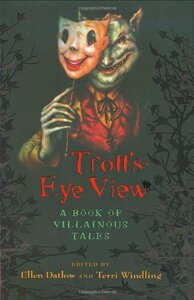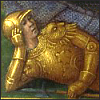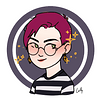Take a photo of a barcode or cover
I've been slightly p.oed even since Datlow and Windling stopped editiing thier adult collections and focused on YA collections. Now, I understand YA is hot (though most of it seems slightly silly), but still. Anyway, with this collection I think I understand why they did it or perhaps I figured out a plus side to this.
This collection has stories told from the villian's point of view. Most of the stories are very good; in particular Peter S. Beagle's story stands out as does the ending of Ellen Kushner's.
The stories, here, however, in particular, those stories at the end, are far darker then the stories in the earlier YA collections. They are closer to adult. They are closer, in many ways, to some of the original tales before Cinderella got singing rodents.
I like this. I really do. Like Pratchett, Datlow and Windling seem to want to get children to think and this collection crosses the bounds between adult and YA quite well. Because of the theme, the stories also get readers to question the whys of things, like - why does the black guy always die first in Hollywood? Why is blonde better? Why princes? Why so much female nudity?
Okay, not that last one, but you get the point. Enjoyable read.
This collection has stories told from the villian's point of view. Most of the stories are very good; in particular Peter S. Beagle's story stands out as does the ending of Ellen Kushner's.
The stories, here, however, in particular, those stories at the end, are far darker then the stories in the earlier YA collections. They are closer to adult. They are closer, in many ways, to some of the original tales before Cinderella got singing rodents.
I like this. I really do. Like Pratchett, Datlow and Windling seem to want to get children to think and this collection crosses the bounds between adult and YA quite well. Because of the theme, the stories also get readers to question the whys of things, like - why does the black guy always die first in Hollywood? Why is blonde better? Why princes? Why so much female nudity?
Okay, not that last one, but you get the point. Enjoyable read.
I have a weakness for retold fairy tales and for short stories, so this collection of fairy tales told from the villains' point of view was a must-read for me. Also, Datlow and Windling consistently helm the best anthologies out there, for kids and adults, and I read every one I can get my hands on. This collection has 15 stories by well-known fantasy authors for children and adults, almost all of which I've read at least something earlier, whether it be a short story or two or a novel or two, and it makes for quite the collection. Like all anthologies, there are a few weak stories, or maybe I should say a few stories I didn't enjoy as much as the others, and a few stories that really stood out.
For me, the stand-outs are almost always the dark stories, for I am a twisted soul, and they leave more of an impact on me. My other stand-out story type is superbly done comedies. (For example, in Deborah Noye's collection Gothic: Ten Original Dark Tales, my two favorite stories are MT Anderson's marvelously disturbing "Watch and Wake" and Neil Gaiman's hilarious parody of gothic conventions, "Forbidden Brides of the Faceless Slaves in the Nameless House of the Night of Dread Desire".) So, of course, my favorite stories from this collection are Holly Black's "The Boy Who Cried Wolf' and Kelly Link's "The Cinderella Game", both very dark, creepy stories with endings that play with the "happily ever after" convention. In "the Boy Who Cried Wolf", the narrator learns about a mysterious flower that turns those who sniff its scent into wolves who then devour whoever is closest, and he has to make some tough choices when he and his family land their boat on an island that appears to be covered with the flowers. In "The Cinderella Game", Peter babysits his new, somewhat disturbed, step-sister (he appears somewhat disturbed as well) and things get weird when he agrees to play a game of Cinderella, in which the lines between the good Cinderella and the evil step-sister are blurred.
There are a lot of other great stories, including Peter Beagle's funny "Up the Down Beanstalk", which retells "Jack in the Beanstalk" from the point of view of the giant's wife (I love how matter-of-fact she is about their diet), Midori Snyder's rather haunting retelling of "Molly Whuppie", called "Molly", and Delia Sherman's "Wizard's Apprentice", which follows a much-abused boy on his path to becoming the apprentice to an Evil Wizard who turns out not to be so evil after all.
Overall, this is another excellent anthology for Datlow and Windling.
For me, the stand-outs are almost always the dark stories, for I am a twisted soul, and they leave more of an impact on me. My other stand-out story type is superbly done comedies. (For example, in Deborah Noye's collection Gothic: Ten Original Dark Tales, my two favorite stories are MT Anderson's marvelously disturbing "Watch and Wake" and Neil Gaiman's hilarious parody of gothic conventions, "Forbidden Brides of the Faceless Slaves in the Nameless House of the Night of Dread Desire".) So, of course, my favorite stories from this collection are Holly Black's "The Boy Who Cried Wolf' and Kelly Link's "The Cinderella Game", both very dark, creepy stories with endings that play with the "happily ever after" convention. In "the Boy Who Cried Wolf", the narrator learns about a mysterious flower that turns those who sniff its scent into wolves who then devour whoever is closest, and he has to make some tough choices when he and his family land their boat on an island that appears to be covered with the flowers. In "The Cinderella Game", Peter babysits his new, somewhat disturbed, step-sister (he appears somewhat disturbed as well) and things get weird when he agrees to play a game of Cinderella, in which the lines between the good Cinderella and the evil step-sister are blurred.
There are a lot of other great stories, including Peter Beagle's funny "Up the Down Beanstalk", which retells "Jack in the Beanstalk" from the point of view of the giant's wife (I love how matter-of-fact she is about their diet), Midori Snyder's rather haunting retelling of "Molly Whuppie", called "Molly", and Delia Sherman's "Wizard's Apprentice", which follows a much-abused boy on his path to becoming the apprentice to an Evil Wizard who turns out not to be so evil after all.
Overall, this is another excellent anthology for Datlow and Windling.
The 4 stars are in spite of the 'poetry' and the stories by Holly Black and Kelly Link. The other stories are excellent.
I have been growing increasingly tired of both anthologies and fairy-tale retellings recently so I was actually pleasantly surprised that this was a decent collection of stories. There weren't any that I would consider to be truly outstanding [kind of shame considering some of the talented writers who contributed] but there also weren't any that I absolutely hated. I think the villain POV theme definitely helped set the book apart from other fairy-tale retelling collections, but I still wish the authors had been a bit more creative. Still, fairy-tale retellings are INCREDIBLY popular lately and I guess there are only so many things you can do with them.
I loved every single short story in this fabulous collection. Even though I already adore most of the authors in this collection, like Garth Nix and Kelly Link, my favorite short story was one by Catherynne M. Valente, who--alas!--I've never heard of before. Her story about the witch in Hansel and Gretel was gorgeous and fascinatingly post-colonial. Some cool commentary going on there. Anyway, highly recommending, just like the other collections I've read by these same editors, most notably A Wolf at the Door, which was one of my adolescent staples. Now that I know how many collections they have out there, I'll definitely be on the lookout for more, and would recommend that you do the same.
I might have liked this book better had I realized when I decided to read it that it was a teen/young adult book and not a continuation of the series that I already knew.
This book contained stories and poems by a dazzling set of authors such as Neil Gaiman, Holly Black, and Jane Yolen. However, most of the tales were not very well fleshed out, even for short stories, and some felt half-finished. I did enjoy "'Skin" and "A Delicate Architecture."
Overall these stories had interesting ideas but so-so execution. For every few stories that I truly loved, there were many more that were just kind of "meh" but I'd still recommend it for the stories that shine in this collection
I love reading fairy tale retellings and I like the take that this compilation took. It was fun focusing on the villains part of the story and learning more about the characters motivations.




